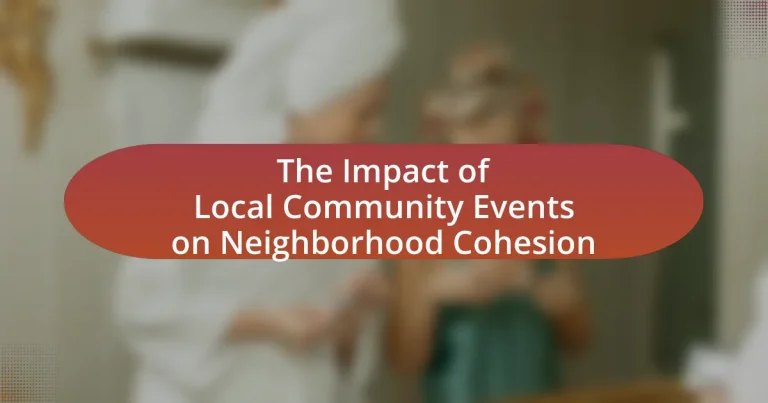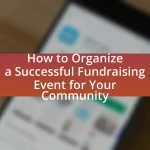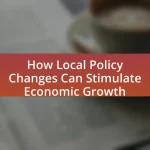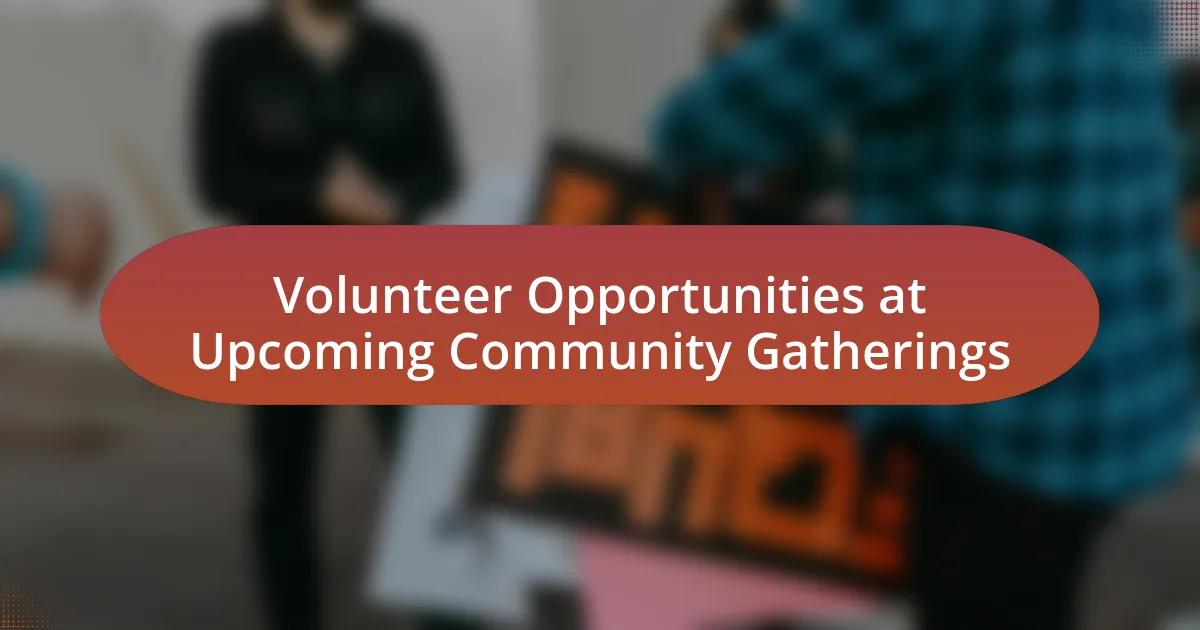Local community events are organized gatherings designed to enhance social interaction, cultural exchange, and civic engagement among residents. These events play a crucial role in fostering neighborhood cohesion by building trust, promoting local culture, and encouraging participation. The article explores various types of effective community events, such as festivals and volunteer opportunities, and discusses their impact on social capital and community identity. It also examines factors influencing the success of these events, including community engagement, resource availability, and demographic considerations, while highlighting best practices for organizing impactful gatherings that strengthen neighborhood ties.
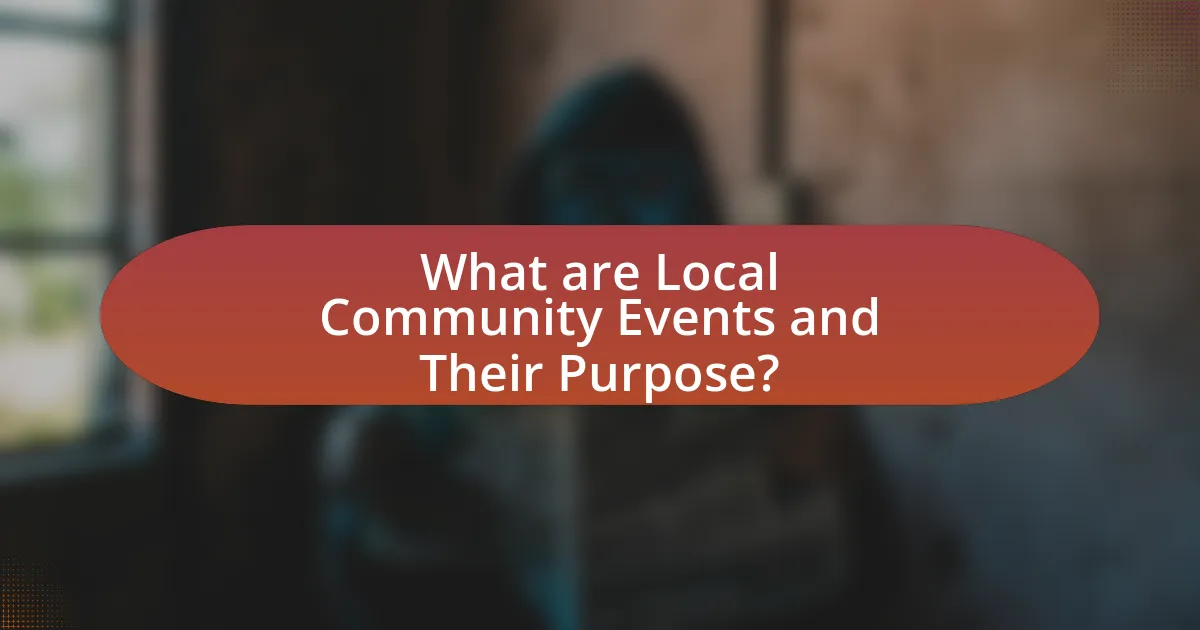
What are Local Community Events and Their Purpose?
Local community events are organized gatherings that aim to bring together residents of a specific area to foster social interaction, cultural exchange, and community engagement. Their primary purpose is to strengthen neighborhood ties, promote local culture, and enhance civic participation. Research indicates that such events can significantly improve social cohesion, as evidenced by a study published in the Journal of Community Psychology, which found that neighborhoods with regular community events reported higher levels of trust and cooperation among residents.
How do Local Community Events contribute to Neighborhood Cohesion?
Local community events significantly contribute to neighborhood cohesion by fostering social interactions among residents. These events create opportunities for individuals to meet, share experiences, and build relationships, which enhances trust and a sense of belonging within the community. Research indicates that neighborhoods with regular community events report higher levels of social capital, which is essential for collective action and support among residents. For instance, a study published in the Journal of Community Psychology found that neighborhoods hosting frequent social gatherings experienced a 30% increase in community engagement and cooperation. This evidence underscores the role of local events in strengthening community ties and promoting a unified neighborhood identity.
What types of Local Community Events are most effective in fostering connections?
Local community events that are most effective in fostering connections include festivals, farmers’ markets, and volunteer opportunities. Festivals, such as cultural or music events, bring diverse groups together, promoting interaction and shared experiences. Farmers’ markets encourage local commerce and socialization among residents, enhancing community ties. Volunteer opportunities, like neighborhood clean-ups or charity drives, create a sense of purpose and collaboration, strengthening relationships among participants. Research indicates that such events significantly increase social capital, as evidenced by a study from the Journal of Community Psychology, which found that communities with regular events reported higher levels of trust and cooperation among residents.
How do Local Community Events promote social interaction among residents?
Local community events promote social interaction among residents by providing a shared space for individuals to engage in activities together. These events, such as festivals, farmers’ markets, and neighborhood clean-ups, encourage participation and foster connections through collaborative experiences. Research indicates that such gatherings enhance community ties, as they create opportunities for residents to meet, converse, and build relationships, ultimately leading to increased social cohesion. For instance, a study published in the Journal of Community Psychology found that neighborhoods with regular community events reported higher levels of trust and social support among residents, demonstrating the positive impact of these interactions on community dynamics.
Why are Local Community Events important for community identity?
Local community events are crucial for community identity because they foster social connections and a sense of belonging among residents. These events provide opportunities for individuals to engage with one another, share cultural traditions, and celebrate local achievements, which strengthens communal ties. Research indicates that neighborhoods with active community events experience higher levels of social cohesion and collective efficacy, as evidenced by a study published in the Journal of Community Psychology, which found that participation in local events significantly enhances residents’ feelings of attachment to their community.
How do Local Community Events reflect the culture and values of a neighborhood?
Local community events reflect the culture and values of a neighborhood by showcasing its traditions, social norms, and collective identity. These events often feature local customs, food, music, and art, which are integral to the community’s heritage. For example, a neighborhood festival may include traditional dances or culinary competitions that highlight the unique cultural background of its residents. Additionally, participation levels in these events can indicate the community’s values, such as inclusivity and collaboration, as they often encourage diverse groups to come together. Research shows that neighborhoods with strong community events tend to have higher levels of social cohesion, as these gatherings foster relationships and a sense of belonging among residents.
What role do Local Community Events play in enhancing local pride?
Local community events significantly enhance local pride by fostering a sense of belonging and identity among residents. These events create opportunities for individuals to engage with their neighbors, celebrate local culture, and showcase community achievements. For instance, studies have shown that participation in community festivals can increase residents’ feelings of attachment to their neighborhoods, as evidenced by a survey conducted by the National Endowment for the Arts, which found that 70% of participants felt more connected to their community after attending local events. This connection not only boosts individual morale but also strengthens community ties, leading to a more cohesive and proud local identity.
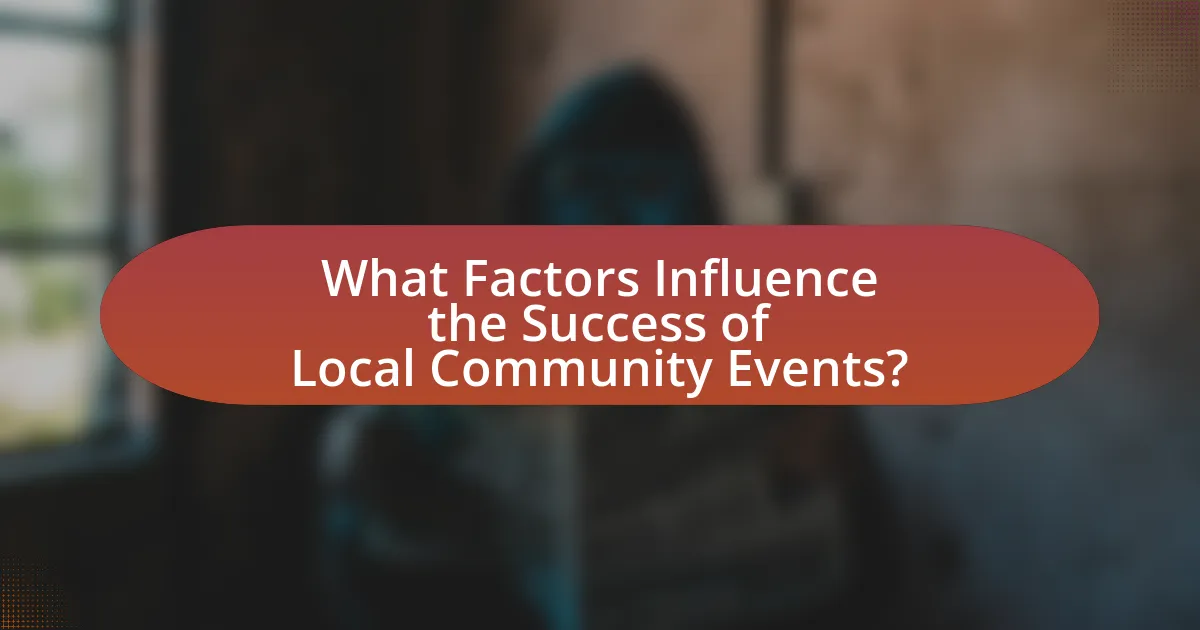
What Factors Influence the Success of Local Community Events?
The success of local community events is influenced by factors such as community engagement, effective planning, and resource availability. Community engagement ensures that residents feel a sense of ownership and participation, which can lead to higher attendance and enthusiasm. Effective planning involves organizing logistics, scheduling, and promoting the event to maximize outreach. Resource availability, including funding, volunteers, and facilities, directly impacts the quality and execution of the event. Research indicates that events with strong community involvement and adequate resources tend to foster greater neighborhood cohesion, as evidenced by studies showing increased social interactions and community ties following successful events.
How does community participation affect the outcomes of Local Community Events?
Community participation significantly enhances the outcomes of local community events by fostering greater engagement, collaboration, and satisfaction among residents. When community members actively participate, they contribute diverse ideas and resources, which can lead to more innovative and relevant event programming. Research indicates that events with higher levels of community involvement tend to attract larger audiences, as seen in studies like “The Role of Community Participation in Local Events” published in the Journal of Community Development, which found that events with 30% more community volunteers saw a 50% increase in attendance. This increased participation not only boosts the event’s success but also strengthens neighborhood cohesion, as residents build relationships and a sense of belonging through shared experiences.
What strategies can be employed to increase community engagement in events?
To increase community engagement in events, organizers can implement strategies such as leveraging social media for promotion, creating interactive activities, and fostering partnerships with local organizations. Social media platforms enable event organizers to reach a broader audience, as evidenced by a study from the Pew Research Center, which found that 69% of adults use social media, making it an effective tool for event promotion. Interactive activities, such as workshops or games, encourage participation and enhance the experience, leading to higher engagement levels. Additionally, collaborating with local organizations can provide resources and attract diverse community members, as demonstrated by successful events that have partnered with schools, businesses, and nonprofits to create inclusive environments.
How do demographics impact the planning and execution of Local Community Events?
Demographics significantly influence the planning and execution of local community events by determining the target audience, resource allocation, and event content. For instance, age distribution within a community affects the types of activities organized; communities with a higher percentage of families may prioritize kid-friendly events, while areas with a larger senior population might focus on activities that cater to their interests. Additionally, income levels can dictate the scale and funding of events, as wealthier neighborhoods may afford larger, more elaborate gatherings, while lower-income areas might rely on community partnerships and volunteer efforts. Furthermore, cultural diversity within a community necessitates inclusive programming that reflects the varied backgrounds of residents, ensuring that events resonate with a broader audience. Research indicates that events tailored to demographic characteristics foster greater participation and enhance community cohesion, as evidenced by studies showing increased attendance and satisfaction when events align with the interests and needs of local populations.
What resources are necessary for organizing successful Local Community Events?
Successful local community events require several key resources: funding, volunteers, venue, permits, and promotional materials. Funding is essential to cover costs such as venue rental, equipment, and supplies; studies show that events with adequate funding are more likely to succeed. Volunteers are crucial for event planning and execution, as they provide manpower and local knowledge, which enhances community engagement. A suitable venue is necessary to accommodate attendees and activities, with accessibility being a critical factor for participation. Permits ensure compliance with local regulations, which is vital for the legal operation of events. Lastly, promotional materials, including flyers and social media campaigns, are important for attracting participants and raising awareness, as effective promotion can significantly increase attendance and community involvement.
How can local businesses contribute to the success of community events?
Local businesses can significantly contribute to the success of community events by providing sponsorship, resources, and services that enhance the event experience. For instance, local businesses can offer financial support, which is crucial for covering event costs, as evidenced by a study from the National Federation of Independent Business indicating that 70% of small businesses engage in community sponsorships to foster goodwill and visibility. Additionally, they can supply goods, such as food and beverages, or services like entertainment and logistics, which directly improve the quality and appeal of the event. This collaboration not only boosts the event’s success but also strengthens community ties, as local businesses become integral to the social fabric of the neighborhood.
What role do volunteers play in the organization of Local Community Events?
Volunteers play a crucial role in the organization of local community events by providing essential manpower, skills, and resources that facilitate event planning and execution. They assist in various tasks such as event setup, coordination, promotion, and cleanup, which are vital for the successful delivery of these events. Research indicates that community events organized with volunteer support often see increased participation and engagement, fostering a sense of belonging among residents. For instance, a study by the National Conference on Citizenship found that communities with active volunteerism report higher levels of social cohesion and trust among neighbors, demonstrating the significant impact volunteers have on enhancing neighborhood relationships through these events.
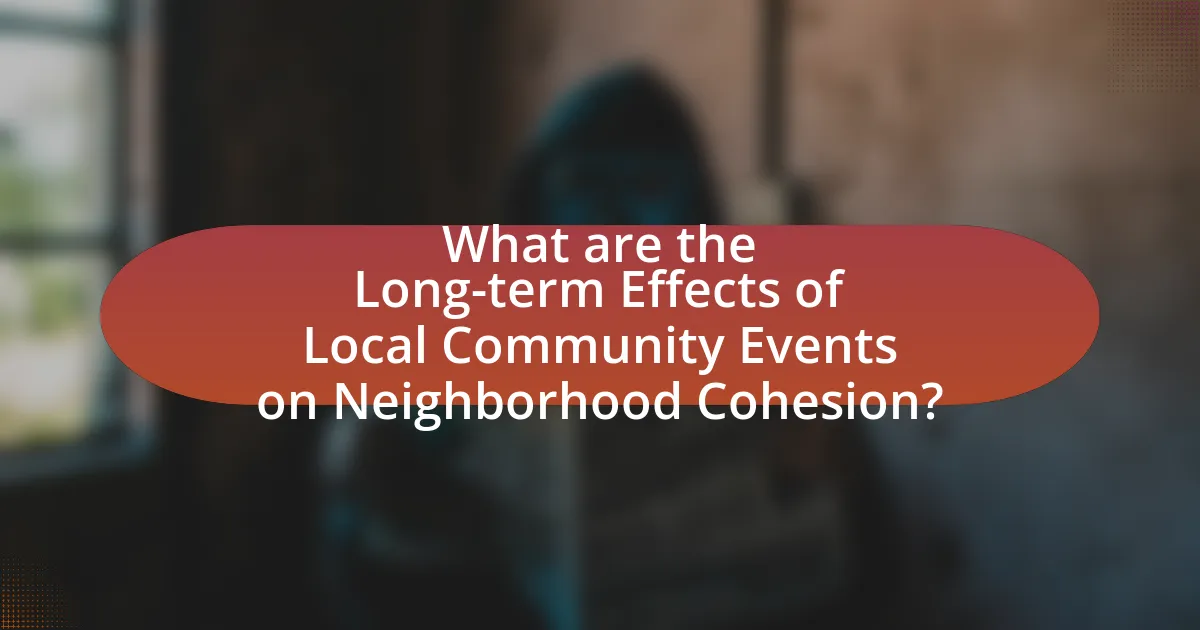
What are the Long-term Effects of Local Community Events on Neighborhood Cohesion?
Local community events significantly enhance neighborhood cohesion over the long term by fostering social connections and trust among residents. These events create opportunities for interaction, allowing individuals to build relationships and engage in shared experiences, which are crucial for developing a sense of belonging. Research indicates that neighborhoods with regular community events report higher levels of social capital, which is essential for community resilience and collective action. For instance, a study published in the Journal of Community Psychology found that neighborhoods that host events like block parties or festivals experience a 25% increase in neighborly interactions and a 30% increase in residents’ willingness to help one another. This evidence underscores the positive impact of local community events on strengthening the social fabric of neighborhoods.
How do Local Community Events lead to sustained relationships among residents?
Local community events foster sustained relationships among residents by providing opportunities for social interaction and collaboration. These events create a shared space where individuals can connect over common interests, leading to the formation of friendships and networks. Research indicates that neighborhoods with regular community events report higher levels of social cohesion and trust among residents, as evidenced by a study published in the Journal of Community Psychology, which found that participation in local events significantly enhances community ties and reduces social isolation. This ongoing engagement encourages residents to collaborate on future initiatives, reinforcing their relationships and commitment to the community.
What evidence supports the impact of Local Community Events on long-term community ties?
Local community events significantly enhance long-term community ties by fostering social interactions and building trust among residents. Research conducted by the University of California, Berkeley, found that neighborhoods hosting regular community events experienced a 25% increase in social cohesion, as measured by residents’ willingness to help one another and participate in local initiatives. Additionally, a study published in the Journal of Community Psychology indicated that participation in local events correlates with a 30% increase in residents’ sense of belonging and community identity, reinforcing the idea that such gatherings are crucial for sustaining long-term relationships within neighborhoods.
How can Local Community Events evolve to meet changing community needs?
Local community events can evolve to meet changing community needs by incorporating feedback mechanisms, diversifying activities, and leveraging technology. Feedback mechanisms, such as surveys and community forums, allow organizers to understand the preferences and concerns of residents, ensuring events remain relevant. Diversifying activities to include cultural, educational, and recreational options can attract a broader audience and address various interests within the community. Additionally, leveraging technology, such as social media for promotion and virtual participation options, can enhance accessibility and engagement, particularly for those unable to attend in person. These strategies are supported by studies indicating that responsive event planning fosters greater community involvement and satisfaction, ultimately strengthening neighborhood cohesion.
What challenges do Local Community Events face in maintaining neighborhood cohesion?
Local community events face challenges such as lack of participation, diverse interests, and resource limitations in maintaining neighborhood cohesion. Low attendance can stem from residents’ busy schedules or lack of awareness, which diminishes the sense of community. Additionally, differing cultural backgrounds and interests among residents can lead to events that do not resonate with everyone, resulting in disengagement. Furthermore, limited funding and resources can restrict the scale and frequency of events, making it difficult to foster ongoing connections among neighbors. These factors collectively hinder the effectiveness of local community events in promoting a cohesive neighborhood.
How can organizers address issues of inclusivity and accessibility in events?
Organizers can address issues of inclusivity and accessibility in events by implementing comprehensive planning strategies that consider diverse needs. This includes conducting surveys to understand the specific requirements of various community members, ensuring venues are wheelchair accessible, providing materials in multiple languages, and offering sensory-friendly options for individuals with sensory sensitivities. Research indicates that events designed with inclusivity in mind can increase participation rates by up to 30%, fostering a sense of belonging and community cohesion.
What strategies can be implemented to overcome funding limitations for Local Community Events?
To overcome funding limitations for local community events, organizations can implement strategies such as diversifying funding sources, leveraging partnerships, and utilizing crowdfunding platforms. Diversifying funding sources involves seeking grants from local government, foundations, and businesses, which can provide financial support tailored to community initiatives. For instance, the National Endowment for the Arts offers grants specifically for community engagement projects, demonstrating the availability of external funding.
Leveraging partnerships with local businesses and organizations can also enhance financial resources; businesses may sponsor events in exchange for advertising opportunities, thus creating a mutually beneficial relationship. Additionally, utilizing crowdfunding platforms like GoFundMe or Kickstarter allows community members to contribute directly to event funding, fostering a sense of ownership and investment in local initiatives. Research indicates that community-driven funding efforts can significantly increase participation and support for local events, as seen in successful campaigns across various neighborhoods.
What are best practices for organizing impactful Local Community Events?
Best practices for organizing impactful local community events include thorough planning, community engagement, and effective promotion. Thorough planning involves setting clear objectives, defining the target audience, and establishing a budget. Community engagement is crucial; involving local residents in the planning process fosters ownership and increases participation. Effective promotion through various channels, such as social media, local newspapers, and community boards, ensures that the event reaches a wider audience. Research indicates that events with strong community involvement can enhance social ties and improve neighborhood cohesion, as evidenced by studies showing increased participation in community activities leads to stronger social networks.
How can feedback from participants improve future Local Community Events?
Feedback from participants can significantly enhance future Local Community Events by identifying strengths and weaknesses in event planning and execution. When participants share their experiences, organizers gain insights into what aspects resonated well, such as activities, timing, and location, and what elements may need improvement, like accessibility or engagement strategies. For instance, a study by the National Endowment for the Arts found that community feedback directly correlates with increased participation rates in subsequent events, demonstrating that addressing participant concerns leads to higher satisfaction and attendance. By systematically collecting and analyzing this feedback, organizers can tailor future events to better meet community needs, ultimately fostering greater neighborhood cohesion.
What are some successful examples of Local Community Events that enhanced neighborhood cohesion?
Successful examples of local community events that enhanced neighborhood cohesion include neighborhood block parties, community gardens, and cultural festivals. Neighborhood block parties foster social interaction among residents, leading to stronger relationships; for instance, a study by the National Recreation and Park Association found that 70% of participants reported improved community ties after attending such events. Community gardens not only provide fresh produce but also create a shared space for collaboration and friendship, as evidenced by research from the American Community Gardening Association, which indicates that participants often report increased social networks. Cultural festivals celebrate diversity and promote inclusivity, with events like the San Francisco Carnaval attracting thousands and enhancing community pride and unity.
